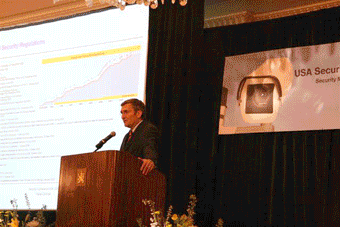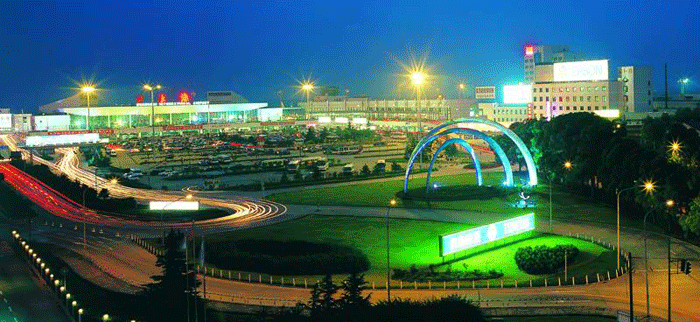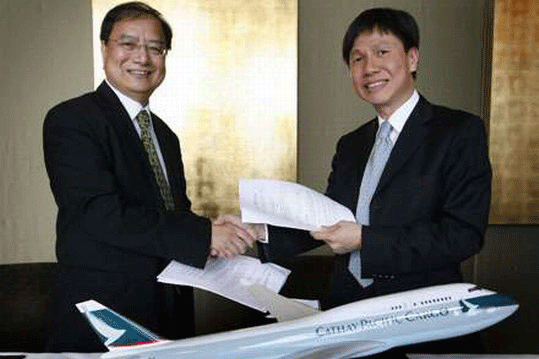TSA Ripped At Security Conference

By now it is clear that the USA Transport
Security Administration (TSA) delivers attitude plus an enforcement-driven
agenda to air cargo.
But if the agency listens at all to what
the market is saying, TSA should think a bit about the heavy criticism
directed toward the agency from many life-long air cargo professionals
that attended Lufthansa Cargo's security conference last week in New York.
“Separate but unequal securities,”
is how one observer described TSA dealings with all-cargo versus belly
lift edicts.
TSA in fact says all air freight transported
on board passenger aircraft is a potential means of terrorist attacks
and thus officially ranked as highly insecure while boxes and packages
flown by all cargo carriers are not regarded as prime target of criminal
intents.
"We see different risk potentials because
the threat factor on passenger and cargo is different," stated Ed
Kelly, the Transportation Security Administration's General Manager during
the U.S. Security Conference held by Lufthansa Cargo on September 30,
at Garden City, Long Island.
Consequently, the TSA mandates different
levels of shipment screening from the industry: 100% on all U.S. domestic
passenger flights already under way, 50% of in- and outbound transport
as of Feb. 9, next year, and 100% on all passenger flights commencing
in August 2010.
Kelly and his TSA's security architecture
was opposed by most participants who strongly recommended a single standard
for both passenger and all-cargo air freight.
"You are just as dead if you are hit
by a passenger plane or a cargo plane," Howard Safir, former Police
Commissioner of NYC said.
"Airplanes with their hundreds of gallons
of kerosene are potential weapons with no difference, if freighters or
passenger aircraft," Safir said, leaving no doubt that TSA's policy
doesn’t sound right or doesn’t even nearly convince him that
it is sound.
Captain Bill McReynolds of FedEx and Chairman
ALPA's Committee on Cargo Security added.
"Air cargo security must be a part
of a multi-layered approach to protect airline crews, passengers, airplanes
and cargo shipments from threat.”
So far “TSA's concept has focused
on passenger airlines and little has been done to air cargo security,"
the pilot and transportation leader and expert said.
“The imposed February 50% deadline
for x-raying passenger cargo seems to be a highly ambitious undertaking
since the TSA has not even validated the screening devices yet.”
"We have meanwhile been audited by
TSA experts but did not get any feedback which of our products and devices
fully complies with the administration's requirements," said Hans
Zirwes, General Manager of Wiesbaden-based Smiths Heimann GmbH when approached
by Air Cargo News FlyingTypers.
Only when this infrastructural topic is
solved however, can agents, warehouse tenants and airlines begin to place
their orders for licensed screening equipment. "From the very day
we get the purchase order we will need about three months to produce the
x-ray machines if we don't have them in stock," Zirwes emphasizes.
Other devices producers will need a comparable
timeframe for starting their mass production of x-ray machines.
The technical infrastructure however, is
only one precondition of having masses of shipments being screened. The
other is trained personnel who can only get to work after the devices
are delivered and put in place.
Both unsolved preconditions and ample space
needed for installing the equipment at airports or warehouses make it
highly unlikely that February 9 can be maintained as launching day for
the 50% x-raying of air cargo.
Instead, most likely is a transition time
of some months to give the cargo industry a chance to comply TSA's mandate.
This move was recommended by a number of
high ranking representatives at the security event but Ed Kelly did not
wave the white flag by scrapping the February deadline.
Rather the executive cited his “mandate”.
“The 50% and 100% milestones are
fast approaching, congressionally mandated and therefore not flexible,"
he declared.
Other critics favored a different architecture
to increase air freight security.
John Hansman, Professor Aeronautics and
Astronautics at The Massachusetts Institute of Technology favored a 'Swiss
Cheese Model' with different security layers, from canines to scanning,
bio-sensors or manual inspection of shipments.
"This variable layer architecture is
the better long term strategy delivering higher security than the single
approach screening concept."
But no matter what security concept might
finally be imposed by the U.S. administration everybody agreed on one
aspect: the additional costs security will demand.
Klaus Holler, Lufthansa Cargo VP The Americas
in his final remarks noted:
"We had to make a tremendous investment
in security.
“Therefore, a screening fee will have
to be imposed or fares increased."
Meanwhile Lufthansa reported a major benefit
due to tightened security:
"Ever since we implemented our security
hub system, thefts have dropped by 98 percent," announced proud Harald
Zielinski, the German cargo carrier's Head of Security and Environmental
Management at the New York meeting.
Still you might wonder, with important deadlines
coming and going for air cargo security, how is it possible for TSA to
present itself as stoic, inflexible and impenetrable?
If last weeks round of emergency USA government
financial bailout activity proved anything, it is that there is indeed
flexibility and sense, above partisan politics, for the common good.
The TSA has some politically-driven decrees
with deadlines on one hand.
On the other TSA can listen and learn and
act in an enlightened manner and stop pointing fingers and snapping off
demands as answers like they did last week in Garden City.
World transportation deserves better.
Kudos to Lufthansa Cargo for hosting this
important event.
Heiner/Geoffrey
Shanghai
Building Paces Growth

Now that Beijing Olympics,
just like the Summer of ’08 is history, at the moment continues
a result of the run-up to the recent past, as Shanghai Pudong International
Airport is now open and ready for action today and tomorrow.
The airport expansion project begun in 2005
currently includes a second passenger terminal, the third runway and the
west cargo terminal.
The second passenger terminal occupies 650
thousand square meters that moves Pudong Airport’s capacity to 60
million passengers per year.
The airport also operates a phase-first
cargo terminal that was expanded in 2005, and the east cargo zone.
Pudong Airport ranks sixth in cargo volume
in the world, according to the Airports Council International (ACI).
The airport has far exceeded its mainland
China counterparts: Beijing Airport and Guangzhou Baiyun Airport.
With an annual growth of 16.3 percent, Pudong
Airport experienced the world's fastest rise in cargo volume in 2007.
The west cargo terminal, located in the
west side of the third runway, occupies an area of 200 thousand square
meters, has an annual capacity of 1.2 million tons.
This terminal is the second largest cargo
terminal in the world, and also the world’s largest newly constructed
cargo terminal.
Employing the west cargo terminal in 2008, Pudong Airport will increase
its capacity to 4.2 million tons a year, making it a real international
cargo hub.
U.S.-based UPS is to establish its Asia-Pacific
transfer center at Pudong Airport, while DHL is currently evaluating its
project of locating the North Asia transfer center there.
Pudong Airport has attracted nine all-cargo
carriers and freighters from 27 airlines.
Four domestic cargo carriers are based in
Shanghai, with 21 freighters in operation.
Another airport of Shanghai, Hongqiao Airport
will launch its expansion project during 2007, with total investment of
USD2 billion (RMB15.3 Billion) to build its second runway and another
250-thousand-square-meter passenger terminal.
The expansion project is scheduled to complete
before 2010, when Shanghai will hold the World Expositions.
The airport’s capacity is expected
to exceed 40 million passengers per year.
David
Cathay
Sets Paper Free
 Present at the signing ceremony for the data interchange agreement
were Mr. Edwin Tsang, (right) General Manager, Airfreight Operations
Support of DHL and Mr. Albert Lo, Manager Cargo Services of Cathay
Pacific.
Present at the signing ceremony for the data interchange agreement
were Mr. Edwin Tsang, (right) General Manager, Airfreight Operations
Support of DHL and Mr. Albert Lo, Manager Cargo Services of Cathay
Pacific. |
Cathay Pacific Airways recently has signed
an agreement for electronic data interchange with DHL Global Forwarding
as part of a move that will take air cargo shipments towards a paper-free
environment.
The agreement is based on the e-freight
model developed by the International Air Transport Association (IATA)
for agreements on data exchange.
IATA's e-freight initiative according to
Head of Cargo Aleks Popovich, “aims to eliminate the need to produce
and transport paper documents for air cargo shipments by moving to a simpler,
industry wide, electronic and paper-free environment.
“Currently, the average cargo shipment
generates more than 30 documents that are used and/or handled by the various
parties involved including shippers, freight forwarders, handling agents,
export and import brokers, airlines, customs and other government authorities,”
Mr. Popovich said.
The new agreement with DHL Global Forwarding
will eliminate the need for printing air waybills, documents made out
by the shipper that confirm the contract between the shipper and carrier.
Cathay Pacific is the first airline to sign an electronic air waybill
agreement with a freight forwarder in Hong Kong.
Cathay Pacific was chosen as one of the
pilot airlines for the IATA e-freight project. It is estimated that the
move to a paper-free environment will save the airfreight industry worldwide
US$1.2 billion annually upon full implementation.
 That
is our son Geoffrey Arend II (left) with Leslie Nielsen and Serdar Kalsin,
all of whom opened nationwide across the USA in the new David Zucker movie,
“An American
Carol” this past weekend. That
is our son Geoffrey Arend II (left) with Leslie Nielsen and Serdar Kalsin,
all of whom opened nationwide across the USA in the new David Zucker movie,
“An American
Carol” this past weekend.
More than a decade ago, Mr. Zucker created
the funniest movies about commercial aviation ever made, the landmark
Airplane and Airplane II films.
Zucker also created Naked Gun and
The Scary Movie series.
Here in An American Carol, a political
satire set in 21st Century America, Kelsey Grammer, Dennis Hopper, John
Voight, Kevin Farley, Robert Davi, Simon Rex and others rework the classic
Charles Dickens Christmas Carol in 2008.
An American Carol gives the USA
political left and Hollywood in general (Zucker is one of a very small
handful of “politically right” directors), and even our sensibilities
a great big poke, and maybe for a change that can't hurt.
Geoffrey Arend II is Mohammed, for which
we will be ever grateful to David Zucker.
In the American Carol storyline,
Mohammed is brought to USA to help destroy Madison Square Garden but instead
he helps save the day after about 75 minutes of popping up in the plot
in one laughable situation after another.
Geoffrey is woven in and out of the film
and of course to his Mom and Dad and family his scenes are high points.
But after watching this movie with a live
audience three or four times over the weekend we noticed folks in the
audience responding and laughing at his performance as well.
On 2,000 U.S. screens this weekend, our
son brings his years of training at The LaGuardia High School of Performing
Arts, NYU Tisch, Royal Academy of Dramatic Arts in London and a half dozen
plays and several feature films to creating Mohammed, a character like
no other in this movie.
More importantly to millions of Americans
and others who will watch this movie, here is a different look at a Middle
Eastern man.
He reminds us of Harpo Marx meets Peter
Lorre with a touch of Buster Keaton as he glides through his scenes. During
a tough political and financial climate in USA there is a lot of noise
about this movie that might overshadow Geoffrey’s deft and wonderful
performance here.
But he is also our very talented kid getting
out to the world where he and all the kids of the next generation belong.
Geoffrey
|



